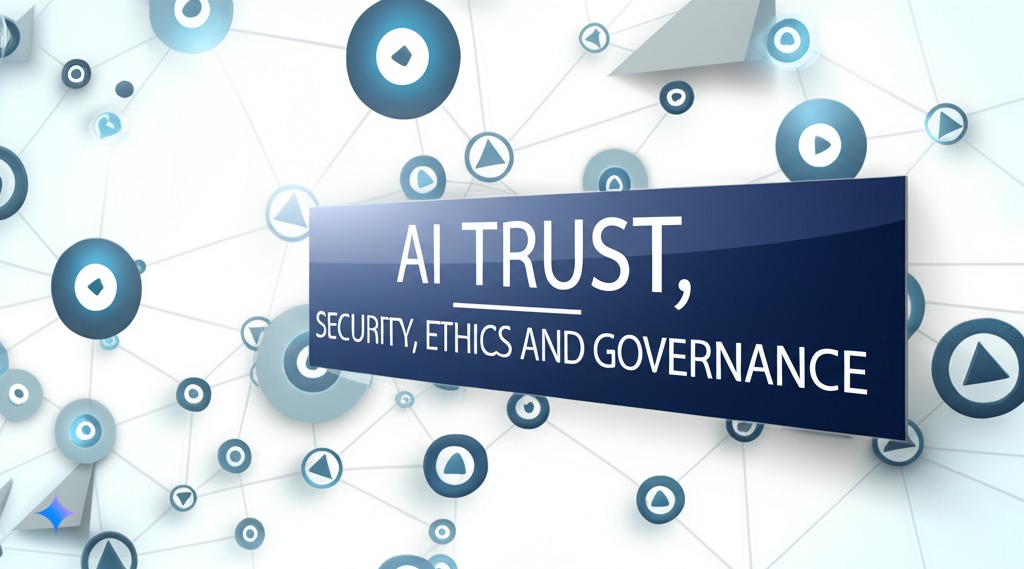Understanding AI Trust, Security, Ethics, and Governance
Let’s keep this very simple. “Trust,” “security,” “ethics,” and “governance” are fancy words, but their meaning is easy:
-
- Trust: Can people believe and rely on AI?
-
- Security: Is AI safe from being hacked or causing harm?
-
- Ethics: Is AI fair, doing the right thing, and respecting everyone equally?
-
- Governance: Are there clear rules and people who keep AI working responsibly?
These four areas help make sure AI systems help people instead of hurting them.
Why AI Trust, Security, Ethics, and Governance Matter
AI is super powerful. It can help doctors find diseases early, drive cars safely, or make shopping online faster and easier. But when AI goes wrong, or isn’t fair, it causes big problems.
Think about these examples:
-
- 73% of business leaders think AI is becoming more like humans, which means clear rules are needed to make sure it’s safe.
-
- Only 6% of US senior leaders have clear rules for ethical AI, though they know it’s very important.
-
- 85% of people prefer companies that use ethical AI.
Without trust, security, ethics, and good rules, AI can make mistakes, treat people unfairly, or misuse private information. This could cause people to stop trusting businesses or AI itself.
Executive Concerns About AI Implementation
Key Takeaways
- Ethical concerns and algorithm bias are the top issues for executives (63%), indicating ethics is central to AI implementation strategies.
- Data security and privacy follows closely at 59%, showing strong focus on protecting sensitive information.
- Compliance with regulations (55%) and responsibility for AI decisions (53%) reveal growing awareness of governance requirements.
- The significant concerns about AI transparency (49%) and accuracy (47%) highlight the importance of explainable AI systems.
How to Build Trust in AI: Practical Steps
Here are simple, practical steps businesses can take today to build trust in their AI systems.
1. Always Be Honest with People
If people are talking to a chatbot instead of a real person, clearly tell them. Being upfront helps build trust.
2. Show How AI Makes Its Decisions – “Explainable AI”
People want to understand how AI comes to its decisions. For example, if AI decides someone can or can’t get a loan, explain the reasons clearly and simply.
3. Regularly Check AI for Problems
AI can change over time or make mistakes. Regular checks help find problems early and fix them quickly. Companies that regularly test AI systems have fewer errors.
Case Study: Unilever
Unilever sells products worldwide, and it uses AI carefully. They do this:
- Check each new AI idea before making it.
- Test finished AI models for bias (unfairness).
- Follow local rules for each country they use AI in.
- Have a special team of senior managers review each AI use.
This helps them avoid problems before people get hurt or trust gets lost.
Best Practices for AI Security
AI security means keeping AI safe from hackers or mistakes. Here’s how:
-
- Keep training data and AI models protected with passwords and encryption.
-
- Watch the AI closely for unexpected behaviors or strange activities.
-
- Always talk openly about problems, so they are fixed quickly.
As an example IBM started a special “AI Ethics Board” in 2019. Every new AI technology they make goes through careful checks by legal, technology, and policy experts. This way, they catch problems early and make sure their AI systems stay safe.
Ethical Problems and How to Solve Them
Sometimes AI treats people unfairly, by accident. Maybe the AI gives different outcomes to boys versus girls. This is called “bias.”
To avoid unfair bias:
-
- Use data from lots of different kinds of people and groups.
-
- Let diverse teams help build AI systems.
-
- Check often to ensure AI remains fair over time.
Real-world Example: Fixing Bias Quickly
Amazon once tried using AI to help hire new workers. But the AI unfairly favored men, because it was trained on data from mostly male workers. Amazon quickly realized this, then stopped using that system to avoid unfair hires.
AI Governance: Making Sure Everyone Follows Clear Rules
Good AI needs clear rules, careful checks, and someone responsible for making sure everything is done right.
An effective governance plan does this:
| Steps for Good AI Governance | Why Important? |
|---|---|
| Set clear rules upfront | Everyone knows what’s expected from AI. |
| Make special teams | People are responsible for checking AI. |
| Regularly check AI systems | Quickly find and fix problems. |
| Follow laws like GDPR, CCPA | Prevent legal trouble and protect privacy. |
What Experts Say
Wendy Turner-Williams, an expert in AI, says clearly, “We can’t work separately. Companies need engineers, ethicists, and managers working as a team to make responsible AI.”
Robert Schner, from AO School of Business, also shares, “It’s important to teach young leaders the right ways to use AI, so they use it responsibly.”
Current AI Rules and What’s Coming Next
Governments around the world are making rules to control AI better. Some major laws and standards include:
-
- GDPR (Europe): Protects personal data and ensures transparency.
-
- CCPA (California): Lets people control their data privacy better.
-
- EU AI Act: New rules to ensure AI is safe and fair.
Future trends show that more laws will come worldwide to manage AI safely and fairly. Companies need to stay ahead and follow these rules carefully.
Challenges and the Road Ahead
AI changes fast, and new technologies like powerful chatbots or driverless cars bring new questions. Balancing creative ideas with responsible rules can be tricky.
Key challenges include:
-
- How to limit risks without losing innovation (new ideas)
-
- Making clear global rules everyone can follow
-
- Having people from different backgrounds work together more
Tips for Staying Updated About AI Ethics and Rules
Here are easy ways anyone can learn more:
-
- Follow AI ethics organizations online.
-
- Attend online webinars about responsible AI use.
-
- Keep updated by subscribing to simple AI newsletters.
-
- Check out government or industry group websites for new rules.
-
- Join online groups or communities discussing ethical AI.
Simple Actions You Can Take
AI trust, security, ethics, and governance are important to help AI make life better, not cause harm.
Do these three things today to make your AI safer and more responsible:
-
- Clearly tell users when they’re using AI.
-
- Always check systems regularly for problems or unfairness.
-
- Create a small team that sets clear rules and checks AI regularly.
When we all take responsibility, AI can make our world happier, safer, and fairer for everyone.
Disclaimer: Image was AI generated.




